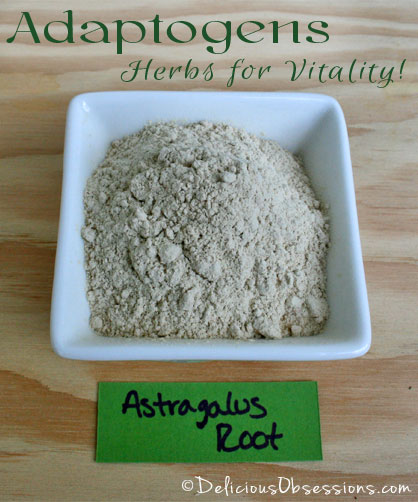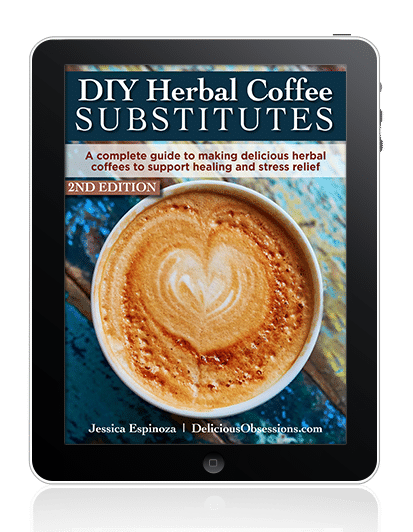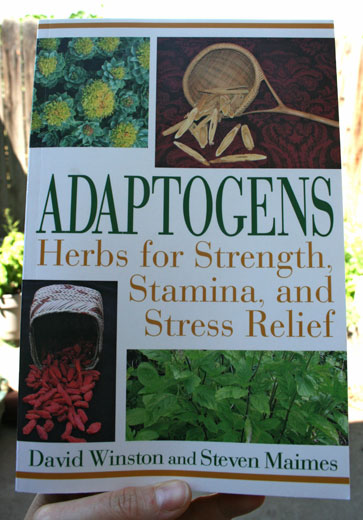FTC Disclosure: Delicious Obsessions may receive comissions from purchases made through links in this article. As an Amazon Associate I earn from qualifying purchases.Read our full terms and conditions here.
Welcome to another installment in my multi-part series, where I am discussing adaptogens and how I am using them to help me on my healing journey. You can read about my journey to health here. If you’re just tuning in to this series, you can read the following articles on the subject of adaptogens:
- Adaptogens: Herbs for Vitality – An Overview
- Adaptogens: Herbs for Vitality – American Ginseng
- Adaptogens: Herbs for Vitality – Schisandra Berries
- Adaptogens: Herbs for Vitality – Eleuthero Root
- Adaptogens: Herbs for Vitality – Shatavari Root
- Adaptogens: Herbs for Strength, Stamina, and Stress Relief: A Book Review
DISCLAIMER: Due to the FDA and FTC laws on health claims, I need to make this very clear. None of the information in this post is to be construed as medical advice. I am not a doctor or certified medical practitioner of any sort. I am simply sharing my own personal experiences, as I travel the long road to optimal health. Statements/products discussed have not been evaluated by the Food and Drug Administration (FDA) and are not intended to diagnose, cure, treat, or prevent any disease or illness. Every person is different and you should always consult your own certified health care practitioner before making changes to your current diet or before beginning any herbal or vitamin supplement regimen or exercise program.
Keep in mind that not all herbs are safe for everyone. We’re all different and our bodies may have different reactions to herbs. I have enjoyed the practice of “simpling” as I have been researching and using more herbs. “Simpling” means that you use a single herb for a period of time, so you can really get to know the herb, how it works, and how you react to it. I find this helpful in identifying things that just may not work for my body. One issue I have always had with complex herbal supplements is that it is often difficult to pinpoint what may be really helping you, and on the other hand, what may be hurting you. Many herbs will work best when paired with other complementary herbs, but I find that simpling is a great way to get started.
Astragalus Root (Astragalus membranaceus)
Astragalus is one of the more commonly known adaptogens. It is in a lot of adaptogenic formulas that you can find at your health food stores and online. Astragalus has a long history in both Traditional Chinese Medicine (TCM) and Asian cultures. The root is the part of the plant that is used and it is native to Mongolia, North Korea, and China. The plants grow in grassy regions and mountainsides where they can get a lot of sun exposure. The plants take 4-5 years before they are ready to harvest. There has not been much clinical research on this adaptogen, but it’s long and wide use in TCM has shown much value to human health.(1)
The taste/energy of astragalus is sweet, slightly warm, and moist. The root is a bright yellow color and the herbs Chinese name is “huang qi”, which means “yellow leader”. It is considered a “leader” in the tonic herbs.(2) It can be used alone, or with other herbs. Like other adaptogens, it is typically not used to treat any specific illness, but rather to help bring the body back into balance and support all of our systems. Health benefits may include:
- Anti-aging
- Increased energy and stamina
- Improved immune function
- Improved resistance to stress
- Balances hormones
- Enhances function of the adrenal cortex
- Inhibits tumor growth
- Helps balance blood sugar levels in the body
- Helps stimulate white blood cells for those undergoing cancer treatments
- Prevents kidney and liver damage caused by medications and viruses (when combined with other herbs)
According to an article on Astragalus on Dr. Oz’s site:
Recent research has shown that this special chemical derived from astragalus can “turn on” an enzyme called telomerase (hTERT). Telomerase acts to maintain or lengthen telomeres, which extend the lifespan of your DNA. If you imagine DNA as a shoelace, telomeres are the plastic aglets at each end. It serves as a protector for your DNA because it keeps it from fraying or damaging. As you age, your telomeres shorten due to wear and tear, which gives your cells an expiration date. However, telomerase helps to preserve telomeres by making them longer. Telemerase is usually “off” in adult cells, except in immune cells, in egg and sperm cells, and in malignant cells, like those found in cancer. The length of your telomeres is important: Researchers have discovered correlations between telomere length and susceptibility to certain aging-related diseases, like cardiovascular diseases (heart attacks, atherosclerosis, and strokes), diabetes, and cancer.(4)
How is Astragalus Root Used?
The most common ways to use astragalus are:
- Tinctures
- Decoctions
The reason that I initially chose to experiment with astragalas was for the reported ability to help balance blood sugar and balance hormones. I was using astragalus occasionally in teas until I read some information that says not to use astragalus if you suffer from an autoimmune disease.(3) There is mixed information on that, so until I can learn more, I am keeping going to stop using it. While it is generally regarded as a safe herb, in TCM, it should not be taken by those who are suffering from acute infections like colds, flu, etc., as it can stagnate and “feed” the illness. In human and animal studies, it has been shown to boost the immune system, which can create problems if you’re on an immunosuppresive medication.(2)
Supporting a Your Stress Response, Adrenals, Thyroid, and Whole Body Through Herbs
When it comes to supporting overall wellness, herbs are a great tool to have in your toolkit, especially those who may be dealing with chronic illness of some type. Since 2009, when I started this site, I have met thousands upon thousands of people through my work and by far, the #1 health complaints are:
- adrenal fatigue (or adrenal dysfunction of some sort) (click here to read all of my adrenal health articles)
- thyroid disorders (hypo-, hyper-, or autoimmune) (click here to read all of my thyroid health articles)
Because of this, I wanted to add in a section into this post about the benefit of using herbs with chronic illness. Adaptogens are by far one of the most used herbs when it comes to working with people who have low energy, fatigue, and overall imbalance in the endocrine system (thyroid, adrenals, and blood sugar).
While the benefits of adaptogenic herbs extend far beyond just supporting that one system, this tends to be one of the main reasons people turn to adaptogenic herbs in the first place. That said there are a lot of other herbs out there that offer amazing support for the body, especially those dealing with chronic illness which is why I wanted to share this section today.
If you are dealing with any type of chronic illness, I’m sorry to break it to you, but caffeine may not be your best friend. 🙁 While you can find lots of info online in both the pro- and the anti-coffee camps, the fact of the matter comes down to the fact that are a lot of people dealing with chronic illness, especially thyroid and adrenal problems, that simply cannot tolerate coffee and caffeine.
While those with sluggish adrenal glands tend to feel run down and in need of a regular pick-me-up (like coffee and other caffeinated beverages), in the long run, caffeine can do more harm than good while you are healing. I go into the “whys” around caffeine and your adrenals in this detailed post here. In addition to the caffeine, there are other constituents, molds, and mycotoxins that can show up in coffee that some people find they react to and can further exacerbate the toxic load on the body.
When I was diagnosed with autoimmune disease and adrenal fatigue, one of the first things that had to go was coffee. In addition to dealing with these issues, we suspected that I was having some detox pathway sluggishness so we wanted to also focus on supporting the liver and lymph systems. Most people who are dealing with chronic illness are also going to have issues with detoxification of the body, which is why herbs can play such an important role.
To be honest, I never drank coffee because of the caffeine. I drank coffee for the taste and aroma, as well as the emotional experience I felt to my morning cup of joe. For me, it was a ritual that I looked forward to every day (and sometimes multiple times a day). Whether I was brewing it at home or going to my local coffee shops, the experience was one that I clung to tightly.
But, when I was faced with new health struggles, I knew I had to do whatever I could to support my body and give it the tools it needed to heal. Giving up coffee and caffeine was one step in this direction.
And it sucked.
I turned to the coffee substitutes on the market in a desperate attempt to recreate the ritual I had grown so fond of, but nothing ever tasted the way I wanted it to. Nothing ever gave me that same experience that my cup of “real” coffee did. I knew there had to be something better, but I simply could not find it on my health food store’s shelves.
Necessity is the mother of invention so that is why I created my own coffee substitutes. They were made with organic, sustainably harvested herbs with zero grains, zero gluten, and zero caffeine. Just herbs.
Herbs that not only tasted delicious but supported my body’s function, like liver detox, bile production, digestion, etc. All of the herbs used in my “coffee” blends have been used for thousands of years to support the body’s normal functions and help everything work a little better — something we all need in today’s toxic world! (psst, dandelion is one of the herbs!)
When it came to creating these blends, if I could get something to not only tasted amazing (and helped me recreate my dearly loved ritual), but also did amazingly supportive things for my body, then it’s a no brainer!
I sold these pre-made blends on Etsy for awhile and the demand was more than I could keep up with. People literally LOVED these blends and were stunned at how much like coffee they actually tasted. Customers who had been dealing with a variety of chronic illnesses had given up coffee to heal their bodies, but like me were deeply missing their morning cup of joe ritual.
After careful consideration and work with some highly experienced advisors, I decided to stop selling the pre-made blends and instead share my proprietary recipes in the form of an eBook. That way I could arm people with the knowledge and recipes they needed to make their own caffeine-free, gluten-free, grain-free blends in the comfort of their own home.
That is why I created the best-selling DIY Herbal Coffees eBook: A Complete Guide To Making Delicious Herbal Coffees to Support Healing & Stress Relief.
Now in its second edition, this ebook features:
- All of my proprietary herbal blend recipes to you can craft a homemade herbal cup of “coffee” at home.
- A ton of researched information about coffee’s impact on the health of those dealing with issues like adrenal fatigue, blood sugar dysregulation, autoimmune disease, thyroid disease, and any other chronic illness.
- Information about all of the herbs used, why I selected them, how to source them, how to prepare and store you “coffees”, and much more.
- Access to your own personal coffee shop where I show you how to recreate your favorite coffee shop drinks and pastries with wholesome, nourishing real food ingredients. No junk here. Only real food.
This book truly is a comprehensive guide to supporting your health, reducing your stress, and bringing a little something special back into your healing journey. You can learn more and download your own copy of this revolutionary wellness guide here, or simply click on the image below.
Further Reading
If you are looking for more info on adaptogenic herbs, I HIGHLY recommend this book, Adaptogens: Herbs for Strength, Stamina, and Stress Relief. It is one of my all-time favorite herb books and probably the one I reference the most. Find it on Amazon here.
Basic Herbal Preparations
If you’re new to herbs and are feeling confused about all the different preparations for them, don’t be! Let me help you out with this Basic Herbal Preparations post. You can also watch the videos below to learn more about a couple herbal preparations and about my favorite source for organic, sustainably harvested herbs.
Ready to Learn More?
Stay tuned for more herbal profiles! I will continue writing about the specific adaptogens that I am using in my healing journey. There are a lot of adaptogens out there, but the key is finding ones that work well for your needs. If you like what you’ve read here, please keep in touch! You can subscribe to my semi-monthly newsletter or subscribe to email updates so you never miss a new post. You can also find me on Facebook, Twitter, Pinterest, and Google+. Have a question? Contact me here.
If you’re interested in learning more about herbs and would like to know who I recommend, check out my Resources page.
References
1. “Astragalas Root and Powder Profile“. Mountain Rose Herbs.
2. “Adaptogens Herbs for Strength, Stamina and Stress Relief”. David Winston and Steven Maimes. Healing Arts Press, 2007.
3. “Astragalus“. About.com Alternative Medicine
4. “Astragalus Root: Is This Right for You?” Dr. Oz.
5. “Five ways astragalus helps your body heal itself“. NaturalNews.com





2 Comments